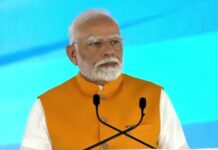By Our Correspondent
NEW DELHI/BHUBANESWAR: Union Minister for Steel and Petroleum & Natural Gas, Dharmendra Pradhan participated in the “Indian Steel: Fostering Steel Usage in Railways & Defence Sectors” organised by the Ministry of Steel in association with Confederation of Indian Industry, CII in New Delhi on Monday. The key objective of the workshop was to have an in-depth discussion with the Railways and Defence sector to identify gaps and opportunities available in the supply of Steel and Steel Products.
Addressing the workshop, Pradhan said that apart from having strategic implication, there is immense economic and social implications of enhanced steel usage across Railways and defence sectors. He said this will also help in creation of jobs. Emphasising the Ministry of Steel’s role as a bridge between the steel industry, Railways and Defence sectors, Pradhan called for a strategic paper highlighting the specific long term requirement of these sectors to form an action plan with the steel industry for domestic fulfilment of the requirement.
Speaking about reducing imports, he emphasized on zero imports in railways and defence sector and further encouraged the domestic industry to produce special steel as per the industry requirements to support indigenisation. The Minister stressed upon the need to develop an ecosystem for start-ups that will support production of special steel and urged the investors and industry to come together in nation’s interest.
The Minister mentioned that Japan and Korea which earlier used to import raw materials and then produce value added steel to export, are experiencing rising cost of production. “Hence, it is opportune time for the Indian industry and the Ministry to create an action plan for production of value added steel for fulfilment of domestic demand and international demand going forward,” he added.
Pradhan also stressed the importance of Steel Import Monitoring System (SIMS) in identifying imports for end use sector and reiterated that this data will enable the domestic steel industry in creating an action plan to manufacture specific steel domestically.
He said, “Our Government has launched a mission named ‘Har Kaam Desh Ke Naam’. Every work we undertake must be towards building a stronger and more prosperous New India”. Shri Pradhan also released the “Safety Guidelines for Iron & Steel Sectors” on the occasion to ensure a zero-accident workspace for the steel sector.
Senior officials of the Railway Board and the Dedicated Freight Corridor Corporation of India Ltd. emphasised the importance of steel for the railways sector. In the previous year, Indian Railways consumed 7 MT of steel and witnessed a 17% increase as compared to the previous year. Indian Railways plans of decongestion through multi-tracking, high speed projects and concentrated focus on 58 super critical projects are expected to increase the demand at a higher pace. In addition, Dedicated Freight Corridor projects are expected to consume 17 MT of steel in the next 5 years. The workshop also witnessed the signing of a MoU between Indian Railways and SAIL for domestic fulfilment of forged axels and wheels.
The Indian Army, Navy and Air Force along with DRDO and the Ordinance Factory expressed the great potential for domestic fulfilment of special steel alloy requirements in the defence sector and welcomed the Ministry’s efforts to act as a bridge between buyer and supplier. However, special emphasis was laid down on the quality requirements of the special steel alloys required for the defence sector. The defence sector also emphasized the need for concentration on value instead of volume and reiterated the importance of research in metallurgy and increased utilization of rare earth metals for the sector. A MoU was also signed between Ordnance Factories and SAIL to facilitate domestic fulfilment of steel requirement.
In his address, Binoy Kumar, Secretary Steel laid emphasis on ensuring quality and competitiveness of steel in line with the increased steel usage. He stated that the Ministry will soon incorporate more steel products under the current quality control order. He also assured that import dependence and uncertainty around strategic steel requirements will be dealt with, and measures will be taken to reduce them.






























